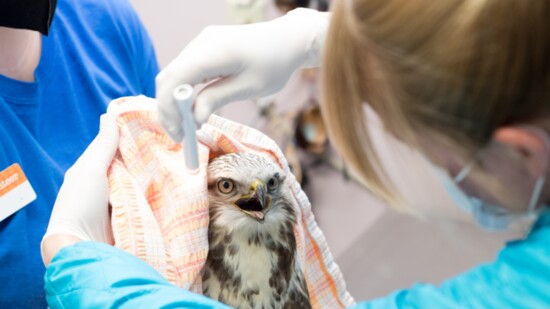For Mick Szydlowski, the three cats his family has adopted through PAWS serve as a constant reminder of the important work the nonprofit organization does daily.
“PAWS is people helping cats, dogs, and wild animals go home and thrive,” said Szydlowski, who serves as the organization’s Director of Public Affairs. “We rehabilitate injured and orphaned wild animals, shelter and adopt out homeless cats and dogs, and educate the community with the goal to inspire compassionate action for animals.”
PAWS accomplishes these goals through three physical locations. The Companion Animal Shelter in Lynnwood is a shelter for cats and dogs as well as an educational hub, PAWS Cat City in Seattle functions as the primary sheltering and adopting location for cats, and Snohomish is home of the new Wildlife Rehabilitation Center.
With over 200 species of wild animals in the area, there is a high likelihood of people encountering injured, sick, or orphaned wildlife. PAWS offers guidance and support in these situations. “PAWS is the largest rehabilitation facility and one that is able to care for the greatest range of animals,” he shared. “We have now cared for over 160,000 injured, orphaned, or sick wild animals.”
PAWS uses an innovative online self-service portal to help citizens correctly identify wildlife and define the nature of the injury or situation. Based on the information entered, the portal provides next steps and contact information for professionals if further assistance is needed.
“If people need additional help or don’t have access to the website, they are encouraged to call our wildlife team at 425-412-4040 between 8am and 7pm, seven days a week. Our admissions specialists are able to talk through the next steps,” he shared. “However, not all animals, such as black bears, can be brought in safely. In those cases, we connect them with the Department of Fish and Wildlife and other partner agencies to ensure that the animal is taken care of.”
For cats and dogs who need care and a home, PAWS provides sheltering and rehoming. “PAWS started in 1967 and since that time, we’ve found homes for over 150,000 cats and dogs. In a given year, we have close to 4,000 cats and dogs that find homes here at PAWS,” Szydlowski shared. “We have an average of 7 transports per month, and these animals come from places like Maui, which are affected by wildfires, and other areas that are impacted by natural disasters, like Louisiana, after hurricanes. They are also coming from states that have big stray populations and overcrowded shelters such as California, Texas, and Florida.”
A large component of helping animals is providing educational opportunities for people to learn about animals and caring for pets. A successful approach is beginning education early by providing programs for children. “We have a six-lesson program for elementary schools, which is done in fourth grade, called the Kids Who Care Program. We offer a variety of live workshops at PAWS that cater to kids who are interested in becoming better cat and dog owners, or pet parents as we call them,” he explained. “We also have programs and workshops that make kids more aware of the environment and how to help injured or orphan wild animals.” Additionally, PAWS offers badge programs for scouting groups and summer service opportunities.
As a 501(c)(3) non-profit organization, PAWS relies on the financial and volunteer support of the community. One of the major fundraising events each year is PAWS Walk, a walk-from-anywhere event where families walk with their pets, log their miles, and fundraise for the organization.
In addition to using volunteers to help at each of their locations, PAWS recruits foster families to provide a temporary place for animals to stay outside of the shelter. “When animals leave the shelter for the weekend, run around in somebody's backyard, socialize with people and other dogs, and potentially have an adventure and go on a hike,” he said, “those animals return to the shelter more adjusted and less stressed, which is better for them.”
Szydlowski says PAWS staff and volunteers are passionate about the mission to help animals and in return, he sees many people benefiting as well. “We often say we are people helping animals and vice versa,” he shared. “Because adopting an incredible cat or dog is a life-changing event. It can help reduce stress and make us feel more connected and grounded.”
For more information on facility locations and the many opportunities to learn, adopt, and volunteer through PAWS, visit paws.org. For injured or orphaned wildlife, visit the self-serve portal on the website or call the Wildlife Team at 425-412-4040.
“We have now cared for over 160,000 injured, orphaned, or sick wild animals.”
